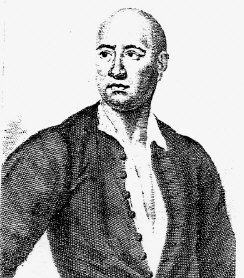 "Here I am Jemmy Figg from Thame, I will fight any man in England".
"Here I am Jemmy Figg from Thame, I will fight any man in England".That was the cry heard around the Marylebone area of London in the early 18th Century where James Figg opened an academy of arms, including boxing.
Standing 6 feet (1.8m) and weighing 185 pounds (84kg), Figg was a stalwart figure who was always ready to accept a challenge to fight. He lost only one match, and on that occasion he was said to be ill.
Figg was the first recognised champion of England at fighting with bare fists. Also an expert at wrestling, swordplay, and fighting with cudgels, he became prominent as a pugilist about 1719 and claimed the title 'Champion of England' from then until about 1730.
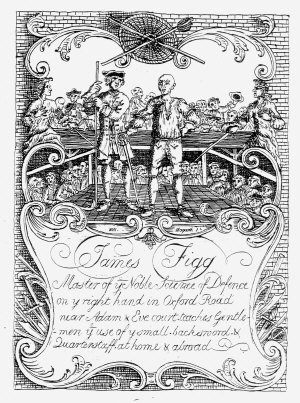 He died in London on December 8, 1734. and is buried at the Old Parish Church of
St. Marylebone, London, England.
He died in London on December 8, 1734. and is buried at the Old Parish Church of
St. Marylebone, London, England.James Figg's grave.
James Figg was born in Thame in February 1684, the youngest of seven children born to Francis and Elizabeth Figg whom popular opinion believe lived in a row of cottages in Priestend.
Being from a poor family in an agricultural town, his early life would not have been easy. He appears to have gained himself a reputation at prize fighting and is known to have frequented the booths at local fairs.
He made his headquarters at the Greyhound Inn in Cornmarket, Thame. However to earn a living as a prize-fighter he would have had to venture far away from Thame.
During Southwark Fair he used to keep a great tiled booth on the bowling green where he entertained from noon to night.
By 1719 he was claiming to be the Champion of England and challenging all comers. Regular Prize Fights were held at a venue called the Boarded House in the Bear Garden in Marylebone Fields off Oxford Street in London.
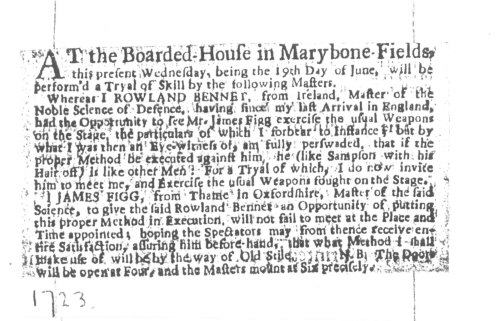
In 1723 the Boarded House held contests every Wednesday and James Figg is advertised as featuring approximately once a month. Challengers came from far and wide and included;
Christopher Clarkson (the Lancashire soldier), Philip McDonald (the Dublin carpenter), William Finn of Ireland, James Stokes Citizen of London, Rowland Bennet from Ireland.
Not only were there men fighting at the Boarded House but often women were advertised and many animals would be baited to fight each other.
A host of other fighters were on the supporting bills to these fights and James Figg gained a reputation as a tutor and trainer. He formed his school probably near to his house on Oxford Street. Figg's Amphitheatre or Great House was the prototype of several other schools of pugilism that were developed in this area of London.
This Great House stood at the corner of Castle Street and Marylebone Fields and just north of Figg's house at the Sign of the City of Oxford in Oxford Road. These streets still exist although they are now known as Eastcastle Street, Wells Street and Oxford Street. It may be assumed that Figg was also a victualer and supplemented his income as a publican with income from his school where he instructed the nobility in the noble arts.
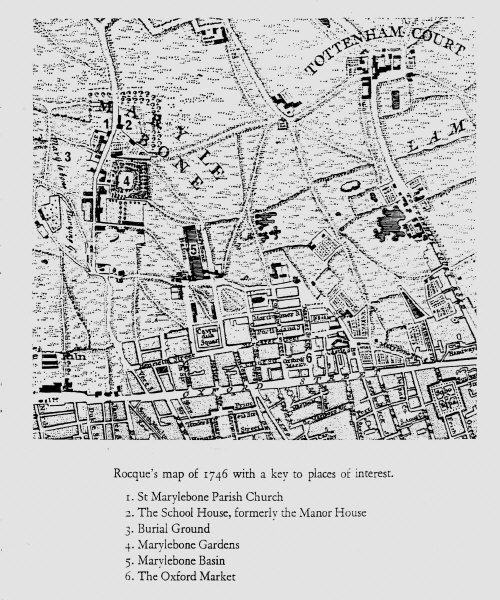
This map drawn in 1746 gives a flavour to this part of London. The grid pattern of streets north of Oxford Street are in the process of development and to the North of these streets, lanes lead to green fields. To the east of the map Marybone Fd is a survivor of earlier lanes and Mr Figg's Great House was located at its junction with Castle Street.
It is claimed that Figg had over 270 fights and only one defeat. That was to Edward Sutton of Gravesend when he was ill. He won the re-match and then came the third and deciding bout with Mr Sutton which was recorded in verse by James Byrom the diarist who wrote in the Spectator. Read Byrom's verse here.
He was not forgotten in his native Thame and his portrait used to hang in the bar of the Greyhound Inn in Cornmarket proudly displayed by the landlord Mr Wall for long after his death.
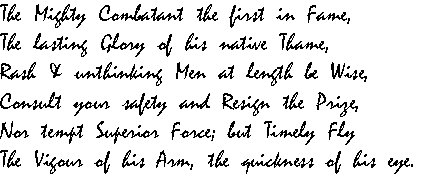
These words were underneath his portrait in the Greyhound Inn.
His death was recorded in all the newspapers of the day, but probably this article is one of the most prophetic;
Last Saturday there was a Trial of Skill between the unconquered Hero, Death, on the one side and till then the unconquered Hero Mr James Figg, the famous Prize-Fighter and Master of the Noble Science of Defence on the other: The Battle was most obstinately fought on both sides, but at last the former obtained an Entire Victory and the latter tho' he was obliged to submit to a Superior Foe yet fearless and with Disdain he retired and that Evening expired at his house in Oxford Road.
James Figg was 50 when he died and left a wife and many children, one of his grandsons also became a Boxing Champion some years later.
Figg may be regarded as the first boxing champion, but he was also the first boxing coach, manager and promoter and a true all round fighter, though he was as proficient with a stick and sword as with his fists.